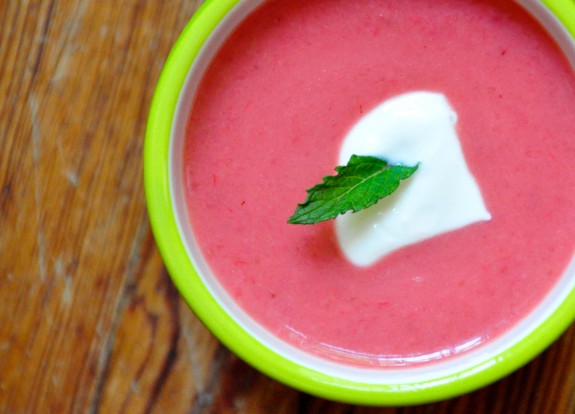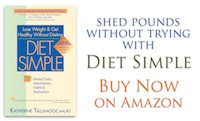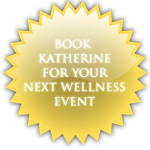Katherine’s Market Recipe: Salad of New Potatoes & Asparagus with Lemony-Garlic-Herb Mayonnaise Topped with Poached Salmon
- At May 27, 2013
- By Katherine
- In News, Recipes
 0
0
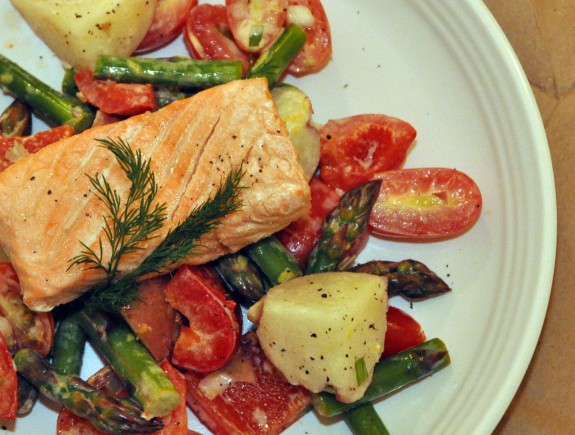
Salad of New Potatoes & Asparagus in a Lemony Garlic-Herb Mayonnaise topped with Poached Salmon (photo by Alison Eaves)
FREE: Download and print my entire new spring recipe chapter from my upcoming cookbook: “Diet Simple Farm-to-Table Recipes,” try a recipe, post its picture and your impressions on my Facebook page, and I’ll enter you in my contest for free Personalized Nutrition services. This wonderful recipe, along with many others, is included!
Today is the 4th “Katherine’s Market Recipe” of 2013, all of which are designed to be delicious, easy, quick, famiy-friendly, nutritious (heart-healthy & diabetes-friendly), and to highlight produce found at our local farmers markets this week. At your farmers market, you’ll find produce picked at peak ripeness, which means maximum flavor, texture, and nutrition. You’re also helping save the environment when you buy at your farmers market. Here’s how…
For my “Salad of ‘New’ Potatoes & Asparagus with Lemony-Garlic-Herb Mayonnaise,” I recommend you buy the asparagus, green onions, tomatoes and tiny potatoes at Wednesday’s Rose Park Farmers Market, Saturday’s Glover Park-Burleith Farmer’s Market, Sunday’s Dupont Circle’s Fresh Farm Market – OR on Sunday, come visit me demonstrating this incredible recipe at the new Downtown College Park Farmers Market.
Salad of “New” Potatoes and Asparagus with Lemony-Garlic-Herb Mayonnaise Topped with Poached Salmon
by Katherine Tallmadge, M.A., R.D.
This “salad”features the best of spring-time gifts: asparagus, green onions, thin-skinned tiny new potatoes and salmon. It can be served warm as a great holiday side dish, or enjoyed cold. The mayonnaise dressing brings out the flavor of any vegetable, especially if allowed to soak into still-warm, just cooked asparagus, haricots verts (the tender French green bean), delicate, small, thin-skinned “new” potatoes, or broccoli. The salmon can be poached, grilled, smoked or cured: your choice!
Serves 6 to 8
Mayonnaise Dressing:
1/4 Cup Mayonnaise, preferably made with Canola or Olive Oil
Grated Zest and Juice of 1 Lemon
2 Garlic cloves (or more, to taste), mashed
1 Tbsp (or more, to taste) Tarragon or other fresh herb such as Dill
Salt and Pepper, if desired (none needed)
Vegetables:
1 quart Asparagus, tough end removed, and cut into 2-inch pieces
1 pint small New Potatoes with skin, cleaned but not peeled (optional)
2 Red Bell Peppers, roasted (if desired) and chopped
1 pint cherry tomatoes, sliced in half
1 Bunch (about 4 – 5) Green Onions, chopped
Salmon:
2 pounds of salmon fillet
1 Bunch Fresh Dill
1 teaspoon Salt
Place the salmon in a frying pan large enough to hold it laid out flat. Pour cold water over salmon until it is covered. Add salt and dill to the pan. Place lid on the pan. Bring to a boil, then turn off the heat and let sit about ten minutes in the hot water. Remove the fish from the water when the flesh is opaque when checked with a fork. Let cool, if desired.
Prepare the dressing in a bowl large enough to fit the salad ingredients by mixing the mayonnaise, the lemon, garlic and fresh herb of your choice. Place in refrigerator to keep chilled.
In a frying pan large enough to fit the asparagus end to end, steam or boil the asparagus slightly (in a small amount of water) for about 3 minutes, until they are al dente (firm, but not hard, with resistance to the bite). Drain and immediately toss in ice water to stop the cooking process. Place in the bowl of cold mayonnaise dressing. Toss to coat with mayonnaise dressing. Put the bowl back into the refrigerator to halt the cooking process.
Slice the small potatoes in half or quarters, depending on their size. Boil the potatoes for about 5 or 10 minutes, until tender when pierced by a fork. Drain and place in the bowl with the mayonnaise and asparagus. Toss to coat with the mayonnaise dressing. Place in the refrigerator.
Roast the red bell peppers if desired, chop, and add to the mix. Chop the white part of the green onions, cut the cherry tomatoes in half, and place in bowl with the other vegetables; toss.
Serve the salad with about 4 ounces of salmon on top of each serving.
FREE: Diet Simple Farm-to-Table Spring Cookbook
Celebrate Your Transformation to a Healthier Lifestyle
I’m enthusiastically and gratefully giving you my most cherished spring recipes from my new upcoming Farm-to-Table cookbook FREE, because I appreciate you – my clients and friends – so much. I feel privileged to be part of your life – as your personal guide in your life and health transformation.
Creating a “Diet Simple” Support Community on Facebook
I really enjoy hearing from you, getting regular updates about your health, your family, and your life. So, I’m going to take it to the next level and form an online “Diet Simple” community on Facebook. It will be our online space to support each other, share our cooking adventures, and celebrate our ongoing transitions to a healthier lifestyle and body weight. To encourage you to get in the habit of Facebooking with me, I’m running a contest with prizes I think you’ll love! Follow the instructions below…
Click my book (above), and you’ll find my book to download…
Diet Simple Contest
1. Download and/or print my new Diet Simple Farm-to-Table Spring recipes,
2. Try one of the recipes – or more – and share a picture and your impressions on my “Diet Simple by Katherine Tallmadge” Facebook page,
3. Everyone who posts a comment or picture will be entered into the contest,
4. Refer a friend to do the same, they’ll be entered, and you’ll be entered into the drawing twice.
The Winner: Chooses From the Following Prizes
1. A guided, personal shopping trip to the Farmers Market,
2. Private chef-for-a-night (I cook dinner at your home while you provide the ingredients),
3. A 5-session nutrition counseling program,
4. A talk at your (local Washington, DC) workplace or conference, or
5. Come up with your own idea, and I’ll consider it!
On CNN: An Egg-A-Day Does Not Increase Heart Disease or High Blood Pressure Risk (Breakthrough Study)
- At February 01, 2013
- By Katherine
- In Articles, News
 0
0
My clients regularly ask me, “Should I be eating eggs? My doctor tells me they’re ‘poison,’ and to avoid eggs because they’ll increase my cholesterol.”
My response? “That’s OLD NEWS!” Read the updated scientific reports on eggs and find out why…
Most of the studies I’ve seen conclude that eggs are fine, I’ve reported in “7 Bad Foods That Are Good for You” in The Washington Post & “Eggs Don’t Deserve Their Bad Reputation, Studies Show” in LiveScience.com’s Expert Voices Op-Ed — and may even improve your health, as they contain nutrients difficult to find in other foods (see below). More importantly, a report by Ying Rong of Huazhong University of Science and Technology and her colleagues published in the British Journal of Medicine in January, reviewed 17 different egg studies.
The study concluded, “Higher consumption of eggs (up to one egg per day) is not associated with increased risk of coronary heart disease or stroke. The increased risk of coronary heart disease among diabetic patients and reduced risk of hemorrhagic stroke associated with higher egg consumption in subgroup analyses warrant further studies.”
The bottom line: Your nutritional needs and food choices should be personalized. You should enjoy food and eating, as it is one of the basic pleasures in life!
The much-maligned egg deserves more respect
My grandmother’s favorite food in the whole wide world was eggs (see recipe below). She loved eggs so much, we named an egg cooking style after her. The “grandmommy egg” was soft-boiled for three minutes. As it sat in an egg cup, we would slice off the top third so the runny yolk would form a delicious and naturally creamy sauce for the white.
Unfortunately, during the last decades of her life, my grandmother came to see eggs as poison and avoided one of her real food pleasures. Health authorities were warning the public against eating eggs for fear that they were a major cause of high cholesterol levels — the bad kind, low-density lipoprotein, known as LDL — and increased risk of heart disease.
New studies show that the caution may have been an exaggeration.
Yes, increased blood cholesterol levels can raise the risk of heart disease. Eggs are high in dietary cholesterol. But does eating eggs raise blood cholesterol and cause heart disease? This is where the story gets somewhat complicated, so stay with me, folks, and I’ll try to make sense of all of this.
First, the research
Most epidemiological research — the kind of research that studies large populations over time and analyzes their diets and their health — has found no connection between eating eggs and increases in heart disease. On the other hand, controlled clinical studies — where researchers feed subjects specific amounts of cholesterol and measure the effect on blood — do show a slight increase in blood cholesterol with increases in dietary cholesterol, though how much depends on genetic factors.
Cholesterol is an important component of all human and animal cells and influences hormone biology, among other functions. Since your body naturally has all it needs from producing its own cholesterol, there is no dietary requirement for more cholesterol. But the American diet contains plenty, since we eat a lot of animal products. All animal products contain some cholesterol, but they also contain saturated fat, an even more significant culprit in heart-disease risk.
“The major determinant of plasma LDL level is saturated fat,“said Alice Lichtenstein, professor of nutrition science and policy at the Friedman School of Nutrition Science and Policy at Tufts University.
And while eggs are high in cholesterol (186 milligrams, 184 of them in the yolk), they’re relatively low in saturated fat (1.6 grams in the yolk).
“In most people, for every 100 milligrams reduction in dietary cholesterol, one would predict a reduction in LDL levels of 2.2 points on average,“said Wanda Howell, professor of nutritional sciences at the University of Arizona.
In fact, during my 20 years of counseling people with high cholesterol, just reducing their saturated fat intake to a range of 4 percent to 7 percent of their calories, causes their blood cholesterol levels to plummet (I usually recommend 4% if you need a dramatic reduction in LDL cholesterol) — a double benefit.
Interestingly, people in Japan — consumers of some of the largest quantities of eggs in the world (averaging 328 eggs consumed per person per year — have low levels of cholesterol and heart disease compared with other developed countries, especially the United States. Why? In part, it‘s because the Japanese eat a diet low in saturated fat.
Americans do just the opposite. Research has shown that we usually have our eggs alongside foods high in saturated fat, such as bacon, sausage and buttered toast. This meal pattern raises LDL levels and makes the effect of eating eggs worse than it actually is.
So how many eggs can you eat? That depends on a number of factors. The American Heart Association no longer includes limits on the number of egg yolks you can eat, but it recommends that you limit your cholesterol intake to 300 milligrams daily, or 200 milligrams if you have heart disease or if your LDL is greater than 100. You decide where that cholesterol comes from!
Other experts go further and say an egg a day is fine.
“The amount that one egg a day raises cholesterol in the blood is extremely small, so small in fact that the increase in risk in heart disease related to this change in serum cholesterol could never be detected in any kind of study,“ said Walter Willett, professor of epidemiology and nutrition at Harvard’s School of Public Health.“Elevations in LDL of this small magnitude could easily be countered by other healthy aspects of eggs.“
Based on the research, my recommendation is if you eat a healthful diet, go ahead and eat an egg a day, says Katherine on CNN. On the other hand, if your cholesterol is high and if you eat the typical American diet — high in saturated fat, devoid of fruits, vegetables and fiber — maybe you shouldn’t be eating an egg a day.
But will taking eggs out of an unhealthy diet make a positive difference? Probably not. I can‘t tell you how many times during my career I‘ve heard people say, “I‘ve cut out eggs, but my cholesterol is still high!“The impact of a healthy, balanced diet cannot be denied here.
Good for you
Assuming you’re eating a healthy diet, here are some ways you may benefit by eating eggs.
Protein. Eggs are considered the gold standard that other proteins are measured against. Because of the superior amino acid mix, an egg’s six grams of protein are absorbed easily and efficiently used by the body. The egg is also low-calorie (74 calories).
Choline. Yolks are one of the best sources of this essential nutrient. Choline is needed for brain development in a growing fetus and may also be important for brain function in adults.
Lutein and Zeaxanthin. These two, important, beneficial phytochemicals found in egg yolks (as well as kale and spinach) help prevent eye diseases, especially cataracts and age-related macular degeneration. While eggs contain less lutein and zeaxanthin than greens, these phytochemicals are more absorbable because of the presence of fat in the yolk.
Vitamin D. Eggs are one of the few natural sources of Vitamin D, important for the bones and teeth. Vitamin D aids the absorption of calcium, which is important for the heart and colon, as well.
To bring this all together, here is a recipe that is a regular meal for me any time of the day — quick, easy, delicious, nutritious!
Eggs Scrambled with Onion, Garlic and Sweet Cherry Tomatoes
Servings: 1
Sauté 1/4 sweet onion and a smashed garlic clove over medium-high heat in 1 teaspoon canola or olive oil until almost soft. Add a handful of chopped tomatoes to the pan (or any other vegetables you happen to have, such as chopped spinach, kale, mushrooms or peppers) and cook for another 5 minutes. Turn down the heat to very low. In a separate bowl, whisk two eggs. Pour eggs into the pan containing the onion, garlic and tomato — add 1 ounce low-fat cheese, if you wish. Stir continuously until eggs are cooked. Pour over toasted, whole rye bread.
The Study: British Medical Journal 2013; 346 doi: http://dx.doi.org/10.1136/bmj.e8539 (Published 7 January 2013)
Study Conclusions: “Higher consumption of eggs (up to one egg per day) is not associated with increased risk of coronary heart disease or stroke. The increased risk of coronary heart disease among diabetic patients and reduced risk of hemorrhagic stroke associated with higher egg consumption in subgroup analyses warrant further studies.”
Bottom Line: “Your nutritional needs and food choices should be personalized. You should enjoy food and eating, as it is one of the basic pleasures in life!”

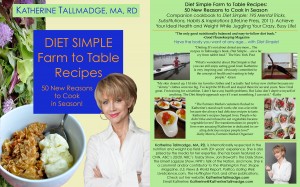

![tallmadgecover3[1]](https://katherinetallmadge.com/wp-content/uploads/2013/05/tallmadgecover31-e1369098089483.jpg)

